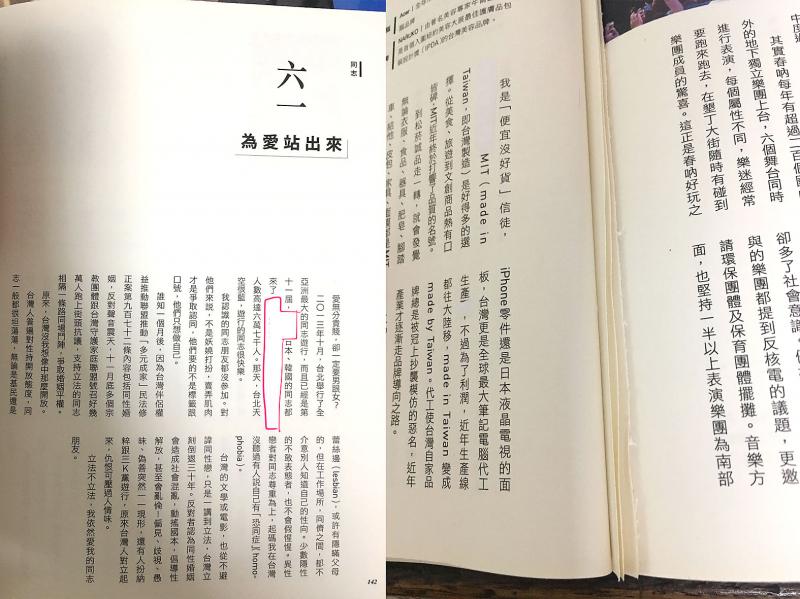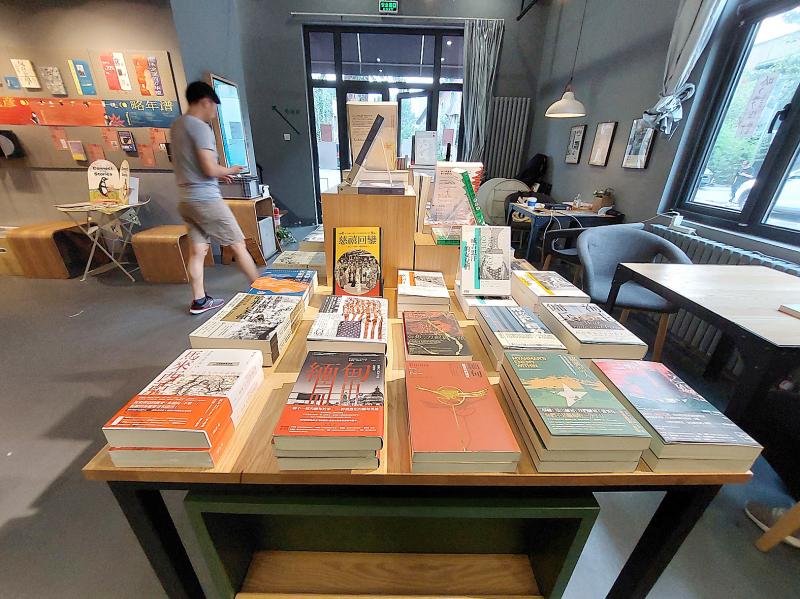Standards for Taiwanese book imports by Chinese resellers have become stricter, an independent bookstore owner in Beijing said yesterday.
In the past, with the exception of titles written by exiled Chinese writer Gao Xingjian (高行健), most books published in Taiwan could be imported to China, the owner said, speaking anonymously.
However, now certain publishers that print works touching upon subjects that are sensitive in China, such as democracy, protests and human rights, are now blacklisted entirely, the person said, citing the experiences of Gusa Publishing (八旗文化).

Photo: CNA
In other cases, books are allowed to be imported, but have entire sections torn out, or have words replaced or removed, they said.
For resellers in China to import Taiwanese books, they must first submit a list of titles they wish to purchase to a state-owned import company, and then there is a wait time of three months — up from six weeks previously — to receive the books, they said.
Regarding the increased time to import books, the owner said that while COVID-19 pandemic restrictions added to delays, a considerable factor was likely the stricter censorship process.

Photo: CNA
“In the past, I would give a list of 100 Taiwanese books to the importer, and about 50 would be approved. Now only around 20 to 30 are approved,” the owner said, adding that the criteria used to approve books is unclear.
Most books on politics and religion, even history books, cannot touch upon China or Taiwan to be imported to China, the person said.
Examples of banned books include the British Museum’s China: A History in Objects, and a selection from the Chinese University of Hong Kong, the shop owner said.
Works by Chinese-American writer Eileen Chang (張愛玲) describing life in China under the communists — such as The Rice Sprout Song and Naked Earth — have always been banned in China.
However, more recently, a book by Malaysian-Taiwanese writer Ng Kim Chew (黃錦樹) published last year that discusses the Chinese Civil War was banned, the person said.
“Some books we could import last year are banned this year. The standards often change, so all we can do is submit our lists and see what happens,” the owner said.
Importers sometimes tell bookstore owners to review and revise their lists before submitting them.
“However, I try to avoid self-censorship. I just submit my list without removing things, unless it is clearly obvious that the book is critical of the Chinese Communist Party,” the owner said.
Secondhand bookstores have also been affected by stricter censorship, the person said, citing Shanghai-based used-book and fashion accessory store Duo Zhua Yu (多抓魚).
The shop was once a popular place to buy books printed in traditional Chinese, but has recently had their inventory drastically reduced, the person said.
“Given the current state of cross-strait relations many bookstores won’t promote Taiwanese books at all, as they are afraid of causing a stir,” the shop owner said.

South Korean K-pop girl group Blackpink are to make Kaohsiung the first stop on their Asia tour when they perform at Kaohsiung National Stadium on Oct. 18 and 19, the event organizer said yesterday. The upcoming performances will also make Blackpink the first girl group ever to perform twice at the stadium. It will be the group’s third visit to Taiwan to stage a concert. The last time Blackpink held a concert in the city was in March 2023. Their first concert in Taiwan was on March 3, 2019, at NTSU Arena (Linkou Arena). The group’s 2022-2023 “Born Pink” tour set a

CPBL players, cheerleaders and officials pose at a news conference in Taipei yesterday announcing the upcoming All-Star Game. This year’s CPBL All-Star Weekend is to be held at the Taipei Dome on July 19 and 20.

The Taiwan High Court yesterday upheld a lower court’s decision that ruled in favor of former president Tsai Ing-wen (蔡英文) regarding the legitimacy of her doctoral degree. The issue surrounding Tsai’s academic credentials was raised by former political talk show host Dennis Peng (彭文正) in a Facebook post in June 2019, when Tsai was seeking re-election. Peng has repeatedly accused Tsai of never completing her doctoral dissertation to get a doctoral degree in law from the London School of Economics and Political Science (LSE) in 1984. He subsequently filed a declaratory action charging that

The Hualien Branch of the High Court today sentenced the main suspect in the 2021 fatal derailment of the Taroko Express to 12 years and six months in jail in the second trial of the suspect for his role in Taiwan’s deadliest train crash. Lee Yi-hsiang (李義祥), the driver of a crane truck that fell onto the tracks and which the the Taiwan Railways Administration's (TRA) train crashed into in an accident that killed 49 people and injured 200, was sentenced to seven years and 10 months in the first trial by the Hualien District Court in 2022. Hoa Van Hao, a